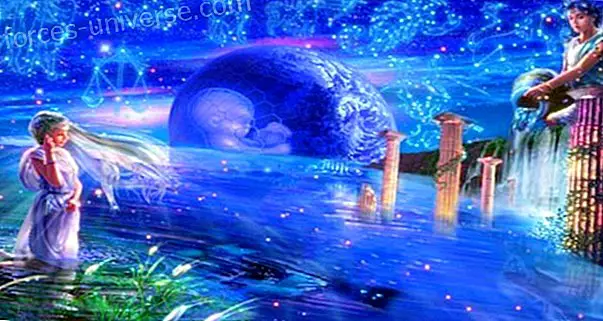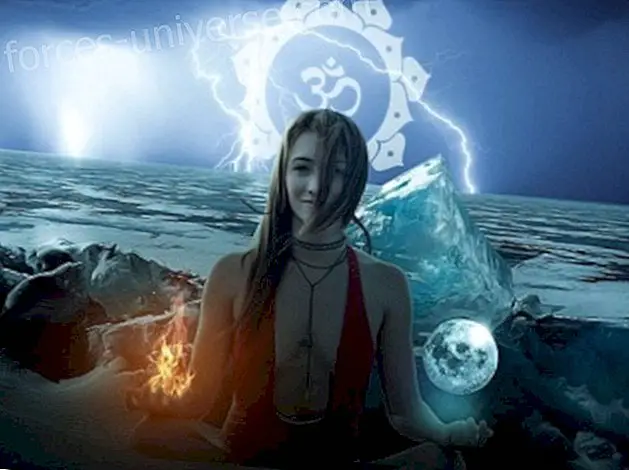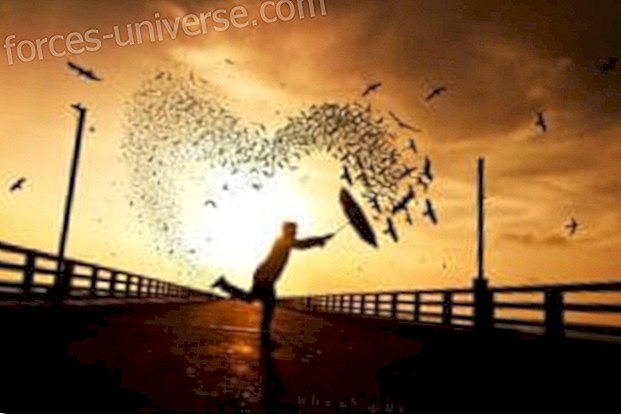
The principles of teaching and the instruction of the senses
In a series of articles that Sri Aurobindo wrote between 1909 and 1910, he enunciated three fundamental principles of teaching:
The first principle of true teaching is that nothing can be taught. The teacher is neither an instructor nor a homework teacher; He is an assistant, a guide. His job is to suggest, not to impose.
The second principle is that you have to consult the mind in its growth.
Sri Aurobindo indicated that the idea of making the child fit in the mold desired by the parents or by the teacher is a barbaric and ignorant superstition. He warned that forcing nature to abandon its own Dharma is to do permanent damage, mutilate its growth and distort its perfection, and that parents or teachers cannot make a greater mistake than deciding in advance that a given student has to develop qualities, abilities, ideas or virtues determined or to be prepared for a previously agreed career.
And the third principle of education that Sri Aurobindo established is to work from the near to the distant, from what is to what will be. In other words, Sri Aurobindo emphasized that education must proceed from direct experience and that even what is abstract and far from experience must be brought within its reach. Knowledge has to be the transition from personal experience to a broader, more intense and higher experience. We find other guidelines in Sri Aurobindo. In explaining the teacher's work instruments, he writes: “Teaching, example and influence; These are the three instruments of the guru (teacher or guide). But the wise teacher will not seek to impose himself or impose his opinions on the passive acceptance of the receptive mind; It will contribute only with what is productive and safe as a seed that will grow under the divine reception within. He will seek to wake up much more than instruct; Its objective will be to promote faculties and experiences through a natural process and free expansion. It will give a method as an aid, as a usable instrument, not as an imperative formula or as a fixed routine. And it will be alert to any transformation of the instrument into a limitation, to the mechanization of the process ”
“What are your method and your system?” Asks Sri Aurobindo, and answers “he has no method and he has them all. Its system is a natural organization of the highest processes and movements that nature is capable of. Applying them even to the smallest details and the most insignificant actions with the same care and dedication as the greatest, in the end they raise everything to the Light and transform everything. “This imperfect nature of ours, ” explains Sri Aurobindo, “contains the elements of our perfection, but in an embryonic state, distorted, out of place, gathered in a disorderly or badly ordered manner. All this material has to be perfected, purified, reorganized, molded again and transformed patiently, not torn apart or cut down, nor liquidated or mutilated, not razed by simple coercion or denial. ”As will be observed, these principles are subtle and complex, and a rigid formula for practice cannot be extracted from them. They impose a great responsibility on the teacher and demand from him the extraordinary qualities of a deep psychologist (Joshi, 1975). As for the formation of the senses, Aurobindo does not seek anything other than perfection. This, he says, must be one of the teacher's main concerns. The two important things that are needed from the senses, he says, are "precision and sensitivity." To achieve them, the senses depend on the unhindered activity of the nerves, which are the channels of their information, and on the passive acceptance of the mind, the receiver. In case there is any obstruction, the remedy is to purify the nervous system. “This process inevitably restores the perfect and unobstructed activity of the channels and, if done well and meticulously, produces a greater activity of the senses. In the yogi discipline, this process is known as nadi-suddhi, or nerve purification. ” The six senses that attend to knowledge - sight, hearing, smell, touch and taste, mind or manas (the sixth sense of Indian psychology) - can be developed through the physical nerves and the organs that are at their endings, but to develop the manas you need the discipline yogi suksmadristi, or subtle reception of images.
Aurobindo wrote: “Telepathy, clairvoyance, clairaudience, foreboding, reading thoughts and personalities and many other modern discoveries are ancient powers of the mind that have been left undeveloped and belong to manas. The development of the sixth sense has never been part of human formation. In the future it will occupy, without any doubt, a place in the necessary preliminary training of the human instrument. Meanwhile, there is no reason why the mind should not be formed to correctly inform the intellect, so that our thinking can begin with impressions, if not complete, if absolutely correct. ”Sri Aurobindo analyzes the causes of the inefficiency of the senses as Information collectors and attributes it to its "insufficient use". He says that students have to overcome the tamasic inertia (mind and obtuse senses) and get used to perceiving the images, sounds and other stimuli that surround them, distinguish one from another, identify their nature, properties and origins, and fix them in the citta so that they are always ready to respond when the memory asks for it. According to him, "attention" is the main factor of knowledge, which considers as the first condition of adequate memory and accuracy. In addition to attention, says Aurobindo, "the concentration on several things at the same time" is often indispensable. He maintains that it is perfectly possible to develop the capacity of double concentration, triple concentration and multiple concentration, since it is a question of abhyasa, or continued natural practice. Together with the faculties of memory, judgment, observation, comparison, contrast and analogy, indispensable aids in the acquisition of knowledge, Aurobindo highlights imagination as the most important and indispensable instrument. It has been divided into three functions: the formation of mental images; the ability to create thoughts, images and imitations or new combinations of existing thoughts and images; and the appreciation of the soul in things, beauty, charm, greatness, hidden suggestion, emotion and the omnipresent spiritual life in the world. "From all angles, it is as important as the formation of the faculties that observe and compare external things." These mental faculties, as Aurobindo says, must be exercised first in things and then in words and ideas. All this has to be done informally, resorting to curiosity and interest, and avoiding the teaching and memorization of norms . Sri Aurobindo criticizes the teaching by fragments, common practice in the current education system. The teaching by fragments, he says, has to be relegated to the fourth storage room of past yearnings. And it is critical, since “every time a subject is taught a little, in conjunction with many others, with the result that what could be learned well in just one year, is poorly learned in seven, and the child comes out poorly equipped, supplied with imperfect knowledge packages, without dominating any of the great compartments of human knowledge ”Of that education system Aurobindo says that he is the one who tries to“ intensify this practice of teaching by fragments in the base and in the center, and change it suddenly to a great specialization at the top. This is to support the triangle at the vertex in the hope that it will be sustained ”(p. 32). Aurobindo, then, found some sense to the ancient system, which was more rational than the modern one: “Although he did not impart such a wide variety of information, he built a deeper, more noble and much more real culture. The superficiality, the discursive lightness and the volatile mutability of the generality of modern minds are largely due to the lousy principle of teaching by fragments. ”
However, Aurobindo makes it clear that in the future education will not need to submit to the old or the modern system, but to select only the most perfect and fastest means of mastering knowledge. For him, every child is an investigator, researcher, analyzer, ruthless anatomist. Appeal to those qualities you have and let it acquire without realizing the appropriate character and the necessary fundamental knowledge of the scientist. All children have an insatiable intellectual curiosity and a penchant for metaphysical inquiry. Use it to gradually bring you to the understanding of the world and of yourself. Every child has the gift of imitation and a touch of imaginative power. Use them to give you the basis of the faculty of the artist (pp. 34 and 35). By letting Nature work, we get the benefits of the gifts he has given us. Aurobindo insists that the attention of the teacher should be directed primarily to the environment and instruments and that, while they are not perfected, multiplying the subjects of frequent teaching means a waste of time and energy. "The mother tongue, " he says, "constitutes the appropriate means of education and therefore the first energies of the child must go to the complete domain of the environment" (p g. 34). In relation to language teaching, he advocates that the appropriate time for the child to begin the study of many languages comes once the mental instruments are sufficiently developed to acquire a language easily and quickly; not when the child partially understands what he is taught and dominates it with difficulty and imperfectly. Believe in the disciplinary value of learning a language, especially your own language that, he says, prepares us to master others. He maintains that with the ease developed in the language itself, mastering others is easier.
The psychic and spiritual education
Aurobindo also talks about mental and psychic education, but his real interest lies in an even higher stage, which, according to him, is Spiritual or supramental education. This does not imply the annihilation of the individual, but its enrichment through contact with the Absolute. The spiritual stage transcends the mental and psychic stage. The justification of psychic and spiritual education resides in three important considerations: a) education must provide the individual with a constant exploration of something that is in the most It is a recidivism of the psychological complexity of human consciousness; b) the most important issue is to consider the purpose of human life, and the purpose of one's life and the role that one plays in society; and only these questions can be answered correctly when the psychic and spiritual spheres have been explored and when one is enabled to develop the psychic and spiritual faculties of knowledge; c) the contemporary crisis of humanity has occurred due to the imbalance between material progress and insufficient spiritual progress. If, therefore, we must respond to this crisis, we must promote the development of psychic and spiritual consciousness.
Aurobindo tries to establish a distinction between the psychic and the spiritual in the following way: in the psychic life, the individual feels an uninterrupted continuity in the world of forms and considers the level as a function Immortal in an endless time and in an unlimited space. Spiritual consciousness goes beyond time and space and is an identification with the infinite and the eternal. Aurobindo expresses the same idea when he says that in psychic life one must discard selfishness, but that in spiritual life there is no sense of being separated. He insists that it is not about the annihilation of the individual, but about its transformation, the ultimate purpose of integral education. When man reaches that education, there is a total transformation of matter. He calls it supramental education, since it occurs not only in the consciences of individual beings, but in the very substance of which they are made and even in the physical environment where they live Sri Aurobindo and Madre began an unprecedented educational experiment (Joshi, 1998c) when, in 1943, a school was established in the retreat of Sri Aurobindo. Sri Aurobindo Ashram in Pondichery with just 20 students. The school soon began to grow and, in 1951, when the number of students had increased and higher education studies were to be organized, it expanded and became the Sri Aurobindo International University Center. The Center was conceived as one of the best means to prepare humanity for a future characterized by the manifestation of a new light and energy, supramental light and energy. It was created so that the elite of humanity could be prepared and work for a progressive unification of the human race; at the same time, it would have to be prepared to embody the new force that would descend to earth to transform it. The Center carried out an experimental research program under the direct guidance of the Mother and became a laboratory for the education of tomorrow (for more details, see Tewari, 1998). The pedagogical doctrine of Sri Aurobindo is closely linked to his futuristic vision of human destiny, reflected in the following statement: “They must be children of the past, holders of the present, creators of the future. The past constitutes our foundations, the present our matter, the future our end and our summit ”(Aurobindo, 1990, p. 12). The mystical and visionary mind of Aurobindo (1971) articulated a concept of life that was unique, since it conceived it as a splendid and multiple opportunity to discover, put into practice and express the Divine; consequently, he visualized an education system that could help the expression of unrealized potentialities, according to his concept of life. This approach required a creative vision and an extraordinary adventure. For him, human destiny is an ascension towards the supermind, towards the realization of the Most High, and his doctrine of education provides a convincing and flexible framework to achieve that goal.
MK Raina






